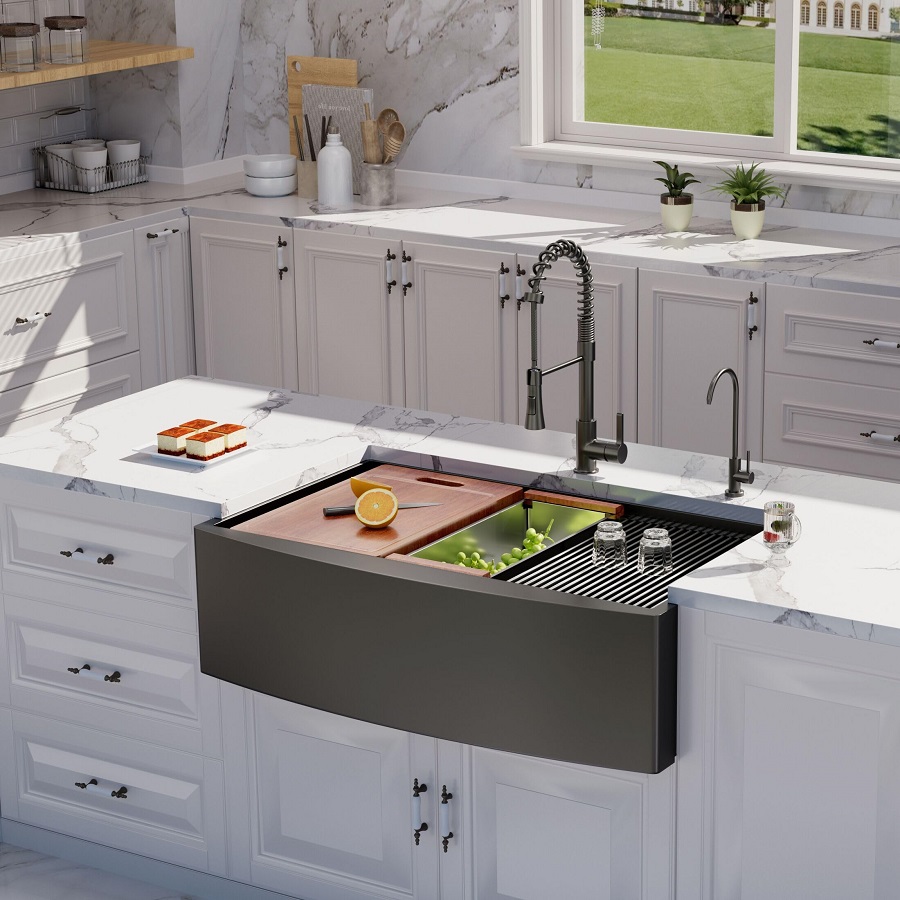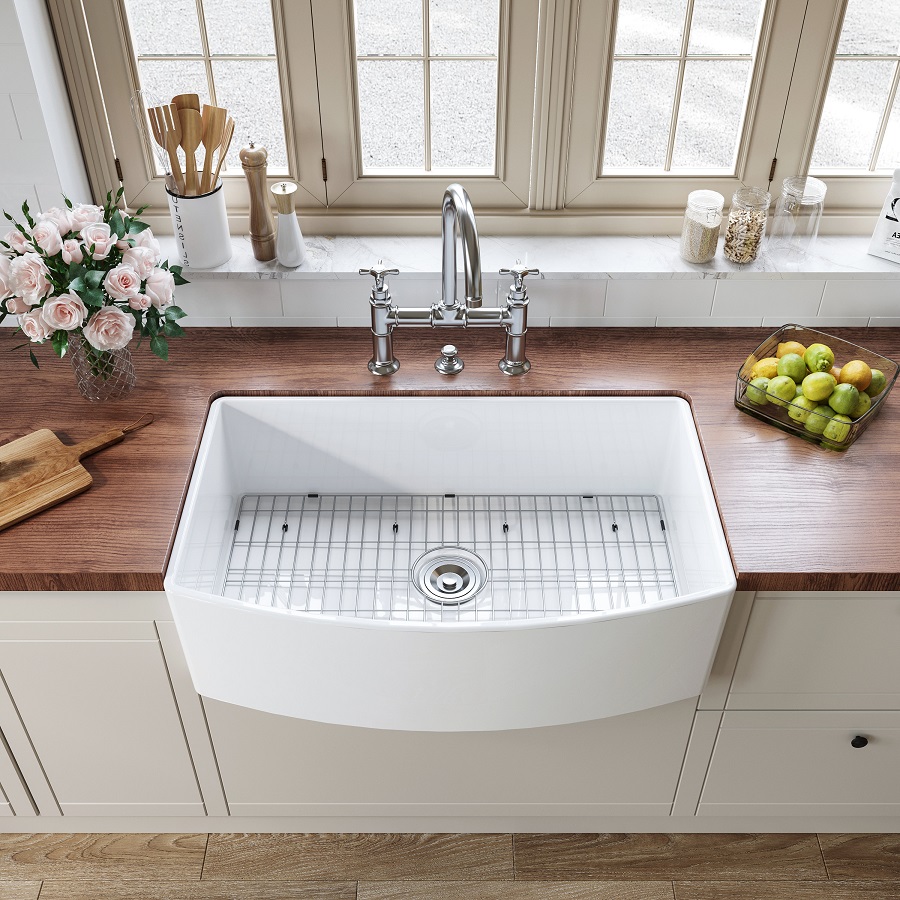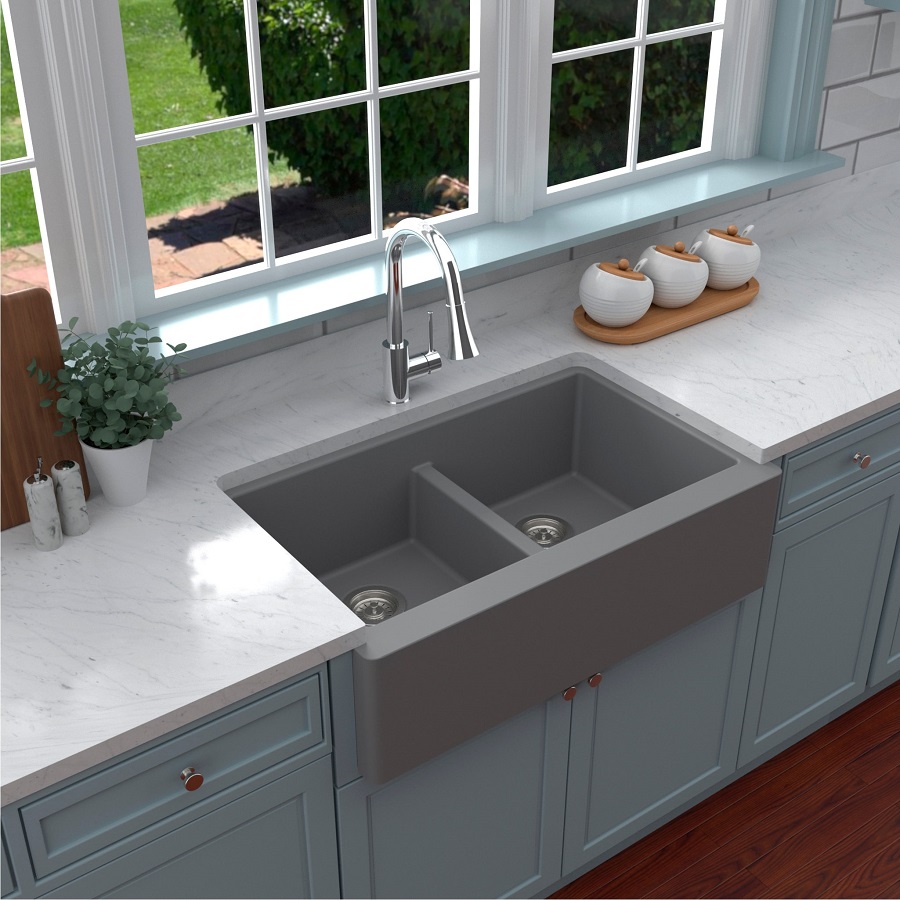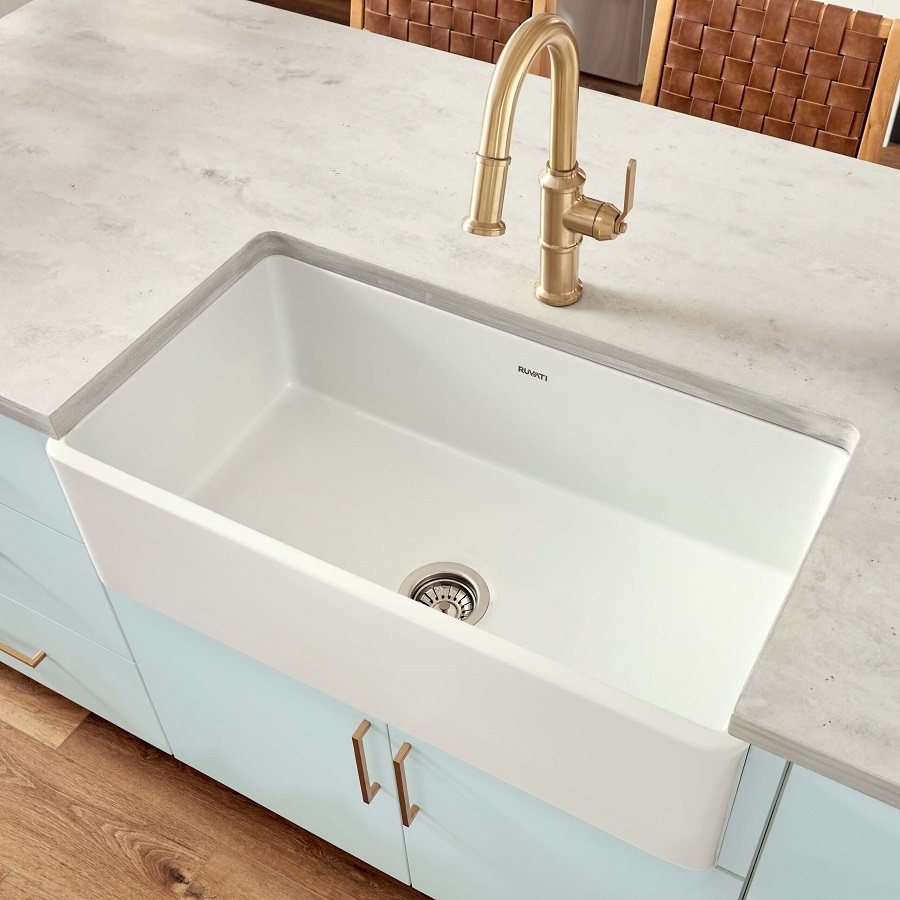The Rise of Farmhouse Kitchen Sinks
The apron farmhouse kitchen sinks have surged in popularity recently. These sinks blend practicality with a timeless aesthetic. They shine as the focal point in a variety of kitchen styles. Given their durability and classic look, it’s no surprise they are a top choice for many. The wide front of the sink offers comfort and ease during use. It also adds to the overall kitchen ambiance with its distinctive style. Homeowners love the depth and roomy basin which make kitchen tasks more manageable. Their design allows for easier reach and less strain on the back. Often made from robust materials, these sinks can handle heavy use. They fit well with the rise of the gourmet home chef trend. More people are looking for professional-looking, yet homey kitchen elements. The convenience and style of apron farmhouse kitchen sinks answer that call. The increased interest in these sinks reflects a desire for kitchen upgrades. People want spaces that are both functional and beautiful. Expect to see more of these sinks as the trend continues to grow.

A Guide to Materials for Apron Front Sinks
When choosing a material for apron farmhouse kitchen sinks, consider durability, maintenance, and aesthetics. Here are the most common materials:
- Stainless Steel: This is a top choice due to its resilience and ease of cleaning. It’s also a fit for modern and industrial kitchen styles.
- Cast Iron: Cast iron sinks coated with porcelain enamel offer a classic look. They are very durable but can be heavy and require strong support.
- Fireclay: Fireclay sinks are known for their durability and resistance to chipping. Their handcrafted appearance brings elegance to any kitchen.
- Copper: Copper sinks bring a unique, rustic charm. They have natural antibacterial properties but require more maintenance to prevent patina.
- Stone: Materials like granite or marble provide a natural, luxurious look. They are sturdy but can be expensive and might need special cleaners.
- Composite: Composite sinks, made from a blend of materials, are tough and can mimic the look of stone without the drawbacks.
Factors such as your personal style, budget, and how much you use your kitchen should guide your material choice. Each type offers a balance between function and style, ensuring apron farmhouse kitchen sinks continue to be a beloved feature in home kitchens.
Choosing the Right Size for Your Kitchen
Choosing the right size for your apron farmhouse kitchen sinks is crucial. You need to consider the size of your kitchen and your usage habits. Here are some key points to keep in mind:
- Measure Your Space: The first step is to measure the area where your sink will go. Apron farmhouse kitchen sinks come in various sizes. Ensure the one you choose can fit into your current layout.
- Consider Cabinet Size: The cabinet beneath the sink needs special consideration. Apron farmhouse sinks require a specific cabinet type. Make sure you have, or can install, one that fits the sink’s dimensions.
- Sink Depth Matters: These sinks are deeper than standard ones. Think about how much room you have below the countertop. Remember, the deeper the sink, the more space it takes.
- Countertop Space: Do not forget about the work area around the sink. A larger sink may reduce the counter space. Striking a balance between sink size and countertop area is essential.
- Kitchen Traffic: Consider the flow of kitchen traffic. A larger sink might get in the way if your kitchen is a busy place.
When chosen wisely, apron farmhouse kitchen sinks meld functionality with style. Remember, it’s not just about fitting the sink in. It’s about enhancing your kitchen’s overall utility and appeal. Pick a size that complements your kitchen’s workflow and aesthetic.

Design and Installation Considerations
When planning to add an apron farmhouse kitchen sink to your home, keep in mind several design and installation factors. Doing so ensures a smooth transition and a perfect fit into your kitchen’s layout.
- Cabinet Modification: Apron sinks typically require a special cabinet with a cutout to accommodate the front of the sink. You may need to alter existing cabinetry or invest in a new one that’s designed for apron farmhouse kitchen sinks.
- Support Requirements: Due to their weight, especially materials like cast iron or stone, these sinks often need additional support. Ensure your cabinetry is sturdy enough or consider reinforcing it.
- Plumbing Adjustments: The depth and placement of apron sinks may necessitate changes to your plumbing. Consult with a professional to modify water lines or drainage as needed.
- Faucet Compatibility: Choose a faucet that complements the design of your sink. Make sure it fits the mounting holes and is easily accessible over the deep basin.
- Countertop Cutting: If you’re retrofitting a sink into an existing countertop, precise cutting is required. This step is crucial for a seamless look and to prevent water damage.
- Sealing and Caulking: Properly seal the sink to the countertop and backsplash to avoid leaks. Use quality sealants, and consider hiring an expert for a reliable seal.
Apron farmhouse kitchen sinks are not just a trendy choice; they’re an investment in your kitchen’s functionality and charm. Pay attention to these considerations, and you’ll enjoy a well-designed kitchen centerpiece for years to come.
Maintaining Your Apron Sink
Maintaining your apron farmhouse kitchen sinks is essential to ensure they look great and last long. Here’s how to keep your sink in top condition:
- Regular Cleaning: Wipe down your apron sink after each use to prevent water spots and buildup. For daily cleaning, use mild soap and a soft cloth or sponge.
- Avoid Harsh Chemicals: Do not use abrasive cleaners or pads that can scratch the surface. If you have a copper sink, avoid acidic substances that may cause patina.
- Protect the Surface: Consider using a sink grid or mat to safeguard against scratches and dings. This is especially important for materials like copper or fireclay.
- Deal with Stains Quickly: Should stains occur, tackle them promptly. Specific materials like stainless steel can resist stains with a gentle vinegar solution.
- Regular Inspections: Regularly check for any signs of wear or damage. Early detection allows for easier fixes and prolongs your sink’s life.
- Seal Properly: Reapply sealants around the sink edges periodically to prevent water damage. This is particularly vital for sinks installed in stone or wooden countertops.
By following these simple maintenance tips, you can keep your apron farmhouse kitchen sinks shining like new. A well-maintained sink will not only look better but will also enhance the functionality and overall appeal of your kitchen space.

Popular Brands and Models
When searching for apron farmhouse kitchen sinks, consider the top brands and models. Each offers quality and style for your kitchen. Here are some popular choices:
- Kohler: Known for durability and variety, Kohler’s apron sinks are favorites.
- Ruvati: Ruvati provides a range of stainless steel and fireclay sinks with modern designs.
- Blanco: Blanco offers premium granite composite sinks in sleek styles.
- Kraus: Kraus sinks blend quality with affordability, suitable for various design needs.
- Bocchi: Bocchi specializes in fireclay sinks with a luxurious finish for elegant kitchens.
- Elkay: Elkay sinks come in different materials, with a focus on stainless steel options.
Each brand brings its unique strengths to the table. Kohler, for instance, is a go-to for those seeking long-lasting sinks with classic styles. Ruvati and Kraus offer more contemporary designs, often sought after by the modern homeowner. Blanco and Bocchi excel in creating sinks with a sophisticated edge, enhancing the room’s elegance. Elkay, with their extensive range, ensures that you find a sink to fit your specific needs and design preferences.
When choosing a model, think about how it will fit with your kitchen’s look and usage. Also, remember to read reviews and experiences from other homeowners. This step can offer you insights about the sink’s performance and customer satisfaction. At the end of the day, your choice should align with both your functional needs and design dreams. Keep your chosen materials and installation requirements in mind to find the perfect apron farmhouse kitchen sink for your home.
Cost and Value Assessment
When considering apron farmhouse kitchen sinks, cost and value are significant factors. Here’s how to assess the investment:
- Budget Alignment: Determine your budget before shopping. Apron sinks vary in price from affordable to luxury.
- Material Impact: The sink material affects cost. Stainless steel and composite are typically less expensive than copper or stone.
- Long-Term Durability: Opt for materials known for longevity. A higher upfront cost can mean fewer replacements later.
- Resale Value: Quality apron sinks may increase your home’s market appeal. This can be a boon if selling is in your future plans.
- Aesthetic Contribution: These sinks can be the kitchen’s star feature. The right choice can significantly enhance the interior design.
- Installation Costs: Factor in potential expenses for cabinetry alteration and additional support if needed.
- Maintenance Costs: Some materials require more upkeep. Consider the ongoing cost of cleaners and sealants.
Sinks from reputable brands might cost more but often offer better warranties and customer service. Weighing initial costs against long-term benefits will help ensure that your apron farmhouse kitchen sink is a wise purchase. Investing in quality pays off in endurance and satisfaction. Choose one that best suits your financial and aesthetic needs for a kitchen that blends charm and functionality.
Incorporating Apron Sinks into Various Kitchen Styles
Apron farmhouse kitchen sinks are versatile. They fit into many kitchen designs with ease. To integrate these sinks into different styles, consider the following points:
- Traditional Kitchens: Here, a classic white fireclay or porcelain apron sink suits well. Opt for detailed faucets to complement the timeless vibe.
- Modern Kitchens: A sleek stainless steel apron sink would be ideal. Pair it with minimalist fixtures for a clean, contemporary look.
- Rustic Kitchens: Consider a copper apron sink for warm, rustic charm. Its natural patina adds character suited to this style.
- Industrial Kitchens: Go for a stainless steel sink with a bold front. This complements other industrial elements like exposed brick or pipes.
- Scandinavian Kitchens: Choose a simple, yet elegant white apron sink. It aligns with the Scandinavian love for functionality and clean lines.
- Farmhouse Kitchens: A large, deep basin in fireclay or cast iron is perfect. These materials add to the cozy, country aesthetic of the space.
- Eclectic Kitchens: Be bold with a stone or brightly colored sink. It can be a focal piece that reflects your unique taste.
For each style, ensure the apron farmhouse kitchen sink’s material and color match your kitchen’s theme. With the right choice, these sinks not only offer utility but also become a statement piece in your home.
